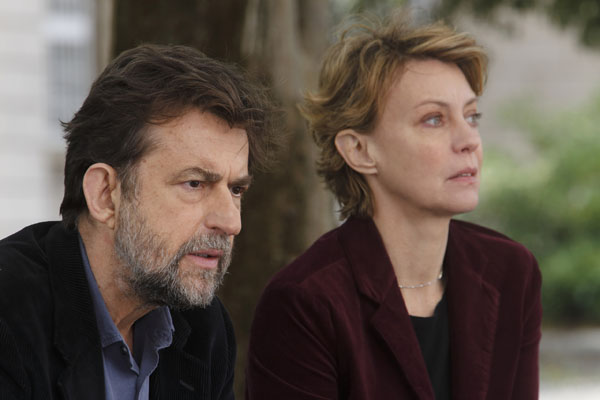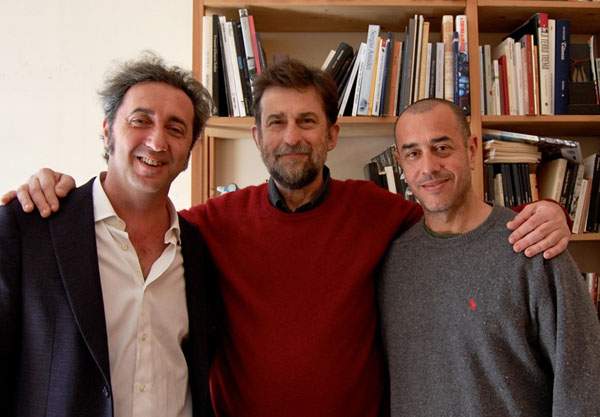Announcing the lineup for this year’s Cannes Film Festival yesterday, Thierry Fremaux noted that Nanni Moretti’s My Mother had just opened in Italy—and he urged those at the press conference (and those of us watching it live online) not to rush down to Rome to see it but to wait and catch it “here in Cannes.” Too late. The first round of reviews had begun appearing the day before. “Would you agree to your film being shown even out of competition?” Cineuropa‘s Vittoria Scarpa asked Moretti on Tuesday. Moretti: “I will agree to anything that Cannes puts to me.” He’s got to be pleased: My Mother will screen in Competition.
Actually, we know he’s pleased. Immediately after the lineup announcement, he posed for a snapshot with Paolo Sorrentino and Matteo Garrone and the three released a joint statement: “We’re delighted and proud to be representing Italy in competition at the upcoming Cannes Film Festival. We’re very aware that it’s a big opportunity for us and Italian film in general. Our films, each in its own way, try to take a personal approach to reality and film; we hope that our presence at Cannes will inspire Italian directors who try to take less obvious, more unconventional approaches to their work.” Sorrentino’s Youth stars Michael Caine, Harvey Keitel, Rachel Weisz, Paul Dano and Jane Fonda; Garrone’s The Tale of Tales features Salma Hayek, Vincent Cassel, Toby Jones, John C. Reilly and Alba Rohrwacher.
“By rights, it shouldn’t add up to much, Nanni Moretti’s new film,” begins Screen‘s Lee Marshall. “Two middle-aged siblings watch their mother die, relatively peacefully, over several weeks. One [Margherita Buy] is a brittle, neurotic director struggling to complete a ‘positive, energy-filled’ film about laid-off workers; the other [Moretti] a mild-mannered engineer. The mother duly departs (no spoilers here: it’s flagged from the start). The film ends. My Mother has none of the death-of-a-child shock factor and tragic catharsis value of 2001 Palme d’Or winner The Son’s Room, and only measured doses of the acerbically comic critique of Italian social and political mores that have endeared Moretti’s oeuvre to international audiences in films like Caro diario or Habemus papam…. But its relatively tranquil surface, its small amusements (many of them revolving around a tasty turn by John Turturro as a histrionically insecure American leading man), its moments of touching, almost Sirkian melodrama, above all its ability to tease resonant themes out of seemingly inconsequential scenes or lines of dialogue, make for a film that is greater than the sum of its parts.”
“Simplicity and maturity of vision are the virtues here,” finds Deborah Young in the Hollywood Reporter. “Though the three-handed screenplay casts a woman in the main role of the short-tempered, self-absorbed, anxiety-ridden filmmaker, this is flimsy masking for a story close to home. Moretti lost his own mother while shooting Habemus Papam.” As for Turturro: “Almost every scene with him is a treat.”
“As an actress,” writes Jay Weissberg in Variety, “Buy long ago mastered neuroses grounded in self-doubt: It’s a psychological profile that blends with Moretti’s usual onscreen persona, and with her nervous reactions and large, distress-filled eyes, she delivers a moving performance as a woman heading toward emotional collapse…. Moretti’s role is small but effective, while the problems with Turturro’s character have nothing to do with the actor himself.”
No subtitles yet
Back in Cineuropa, Vittoria Scarpa finds that My Mother “gets under your skin, fills you with emotion and thoughts, and doesn’t let you go.”
Update, 5/14: “Mia Madre is an intimate and sincerely felt family portrait, which ends up betraying its own indifference to anything beyond the confines of the family,” finds John Bleasdale at CineVue.
Updates, 5/18: Milan-based Celluloid Liberation Front for Indiewire: “Margherita’s failure to elaborate on her grief is mirrored in Moretti’s failure to construct a coherent film where the spectator can find a way into its meaning, rather than being caught in a confused web of suggestions, half-baked ideas and circular exposition. The mediocre film Margherita is working on ends up reminiscing the equally disappointing film Moretti has made.”
For Mike D’Angelo at the Dissolve, “half the film is a broad comedy, the other half a sober dreamscape. The comedic half works considerably better, thanks in large part to John Turturro’s self-mocking performance as an Italian-American movie star (hilariously named Barry Huggins) who pretends to speak Italian more fluently than he actually does and brags—not even humblebrags, just plain brags—about having been fired by Stanley Kubrick.”
“Moretti has made a career partly out of evading dramatic conventions, but he also has a weakness for broad strokes,” writes Ignatiy Vishnevetsky at the AV Club. “My Mother’s two halves—behind-the-scenes comedy and domestic drama, connected only by the character of Margherita—don’t interact in a meaningful way, and Margherita’s psychology is so bolded and underlined that it never has time to develop complexity.”
But for the Guardian‘s Peter Bradshaw, My Mother “is a tremendously smart and enjoyable movie.” More from Geoff Andrew (BFI), Nicholas Bell (Ioncinema, 2.5/5), Sophie Monks Kaufman (Little White Lies), Oliver Lyttelton (Playlist, B+), Andrew Pettie (Telegraph, 2/5), Barbara Scharres (RogerEbert.com) and Marc van de Klashorst (International Cinephile Society).
Updates, 5/19: “Unlike the dilemmas of the grief-haunted parents in The Son’s Room, Margherita’s troubles fail to really move or engage,” writes Alex Ramon at PopMatters. “What emerges instead is a mild and mediocre ode to family and filmmaking.”
“Moretti can break your heart and he can dance on your last nerve,” writes Wesley Morris for Grantland. “Sometimes he can do one while being fully aware that he’s also doing the other. It’s been a while since he’s gotten near my heart—it was 2001’s The Son’s Room, which did it for everybody.”
Alchemy has taken US rights, reports Deadline‘s Anthony D’Alessandro.
Updates, 5/22: For Glenn Heath Jr., dispatching to the L, “there’s a strange divide in tonality between serious and silly (often portrayed by Turturro’s buffoon of a character) that Moretti never solves. Still, Buy’s performance reservedly confronts a scary and insecure psychological place, slightly elevating the film beyond the realm of mediocre arthouse drama.”
Ariston Anderson talks with Moretti for the Hollywood Reporter.
Cannes 2015 Index. For news and tips throughout the day every day, follow @KeyframeDaily. Get Keyframe Daily in your inbox by signing in at fandor.com/daily.





